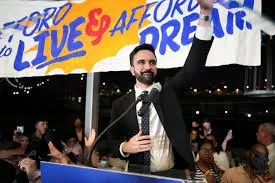Can a Muslim socialist win NY’s mayoral race?
By The Taurean
Zohran Mamdani faces fierce backlash over his views on Palestine and Modi. Can he overcome Islamophobic smears and win the November election?
THE WORLDVIEW
July 6, 2025
THE 33-year-old Muslim socialist candidate and presumptive Democratic nominee for New York City’s mayor, Zohran Mamdani, has emerged as a key figure in one of America’s most high-profile local races. His rise has been marked by a surprising primary victory over former governor Andrew Cuomo, but it has also sparked intense criticism and political attacks, particularly related to his outspoken views on the Palestinian issue and Indian politics.
It is important to analyse the nature of the criticism he faces, the responses from his camp, and whether these controversies are affecting his popularity as he prepares for the November 2025 general election.
Mamdani’s progressive platform and identity as a South Asian Muslim democratic socialist have made him a target for a broad spectrum of opponents. His critics include conservative politicians, right-wing media, some Jewish advocacy groups, Hindu nationalist factions, and even sitting US President Donald Trump.
A major source of controversy is Mamdani’s stance on Palestine. He has declined to condemn the phrase “globalise the intifada”, which many Jewish organisations interpret as incitement to violence. Mamdani clarified that he does not use that language himself but frames his position around universal human rights and the need to combat bigotry. Despite this, Jewish groups and the US Holocaust Museum have condemned the phrase as deeply offensive and harmful.
Additionally, Mamdani has been sharply critical of Indian Prime Minister Narendra Modi, accusing him of orchestrating the 2002 Gujarat riots and labelling him a “war criminal”. These comments have drawn backlash from Hindu nationalist groups and some Indian-American politicians, who accuse the Muslim leader of stoking religious divisions and promoting hatred.
Beyond international issues, Mamdani’s progressive policies — such as rent freezes, city-operated grocery stores, free public transportation, and increased taxes on wealthy neighbourhoods — have alarmed real estate interests and centrist Democrats. Media outlets like the New York Post have dismissed his ideas as impractical or symbolic gestures lacking substance.
Political and media attacks
Mamdani’s critics have launched a wave of Islamophobic and xenophobic attacks. False claims alleging he supports terrorism, would impose Sharia law, or has ties to extremist groups have circulated widely, especially among Trump supporters and far-right commentators. These baseless accusations echo post-9/11 conspiracy theories and have been condemned as smear tactics designed to intimidate voters and discredit the candidate.
President Trump has escalated his attacks, calling for Mamdani’s arrest, deportation, and denaturalization — despite Mamdani being a naturalised US citizen since 2018. Mamdani views these statements as politically motivated distractions aimed at diverting attention from Republican legislative priorities and appealing to division rather than addressing economic issues affecting working-class Americans.
Is Mamdani’s popularity declining?
Despite the intense criticism and high-profile attacks, there is little evidence that Mamdani’s popularity is declining. On the contrary, his decisive victory in the June 2025 Democratic primary — winning approximately 56 per cent of the vote after ranked-choice tabulation against a well-known opponent — demonstrates strong support among Democratic voters in New York City.
Poll data since the primary indicates that Mamdani remains a frontrunner in the general election, with a coalition energised by his progressive platform and identity as a fresh voice in politics. His campaign’s effective use of social media and organisational skills have helped counteract negative portrayals and misinformation.
Mamdani’s unapologetic stance on controversial issues appears to resonate with a significant segment of the electorate, especially younger and more diverse voters who prioritise social justice and affordability. His commitment to combating hate crimes and improving quality of life in New York City also broadens his appeal beyond ideological lines.
The challenges ahead
However, the general election will be more challenging. Mamdani faces incumbent Mayor Eric Adams, Republican Curtis Sliwa, and potentially Andrew Cuomo running as an independent. Wealthy donors and special interests opposed to Mamdani’s agenda are mobilising significant resources to defeat him.
Also, the Democratic establishment remains cautious, concerned that his “polarising views” could alienate moderate voters and provide ammunition to the Republicans. Moreover, the persistent attacks and misinformation campaigns could erode support among swing voters or those less engaged with his core messages. The effectiveness of Mamdani’s campaign in addressing these concerns and expanding his base will be critical in the coming months.
Mamdani remains defiant and committed to his vision. He characterises much of the criticism as caricatures and misinformation, emphasising his dedication to fighting all forms of hate and discrimination. He argues that the attacks from Trump and others are attempts to distract from real economic issues affecting New Yorkers, such as the cost of living crisis and housing affordability.
His campaign continues to focus on progressive policies aimed at improving the quality of life for working-class New Yorkers, including rent freezes, expanded affordable housing, and increased funding for anti-hate programmes. Mamdani’s ability to maintain his coalition and broaden his appeal beyond the progressive base will be key to his success.
The bottom line
Zohran Mamdani’s candidacy for New York City mayor has become a focal point for broader cultural and political battles involving identity, human rights, and the limits of political discourse. While he faces severe criticism and politically motivated attacks from multiple fronts — including President Trump — his popularity among Democratic voters remains robust for now. His progressive stances and personal charisma continue to energise a diverse coalition, suggesting that his appeal is rooted in substantive issues rather than mere rhetoric.
The November general election, however, will test whether Mamdani can translate this momentum into a broader mandate amid fierce opposition. For now, the evidence indicates that the constant criticism has not significantly diminished his support; rather, his stances appear to be a source of strength that sustains his popularity in a deeply divided political landscape.
